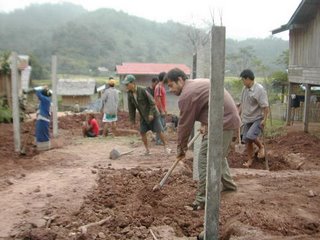Romantizing Tribal Life
A key criticism of any person who speaks of the economic, social or environmental benefits of traditional lifestyles often centres around the accusation that you are romanticizing tribal life. The suggestion that the people living traditional rural lifestyles might be better off than their more “developed” contemporaries, is often viewed as heresy among the developed world and many development professionals. For example, among the Khmu people this could mean practising shifting cultivation, living in homes made from natural materials, harvesting non-timber forest products and wildlife, and basically living a subsistence lifestyle outside the modern economy.
Often charges of racism and a sadistic desire to trap people into an anachronistic and inherently inferior way of life are levelled at proponents for traditional knowledge and practises. What right does anyone have to say that the Khmu people, or any other group of people, should have to live under such conditions just to satisfy the perceptions of outsiders? Do they not have the right to develop their communities, and enjoy the benefits of modern life and scientific and technological progress?
In my opinion, the answer to these questions is that no one has the right to force their perception or their belief in the most appropriate way for a community to exist or develop, including development professionals such as myself. With respect to the Khmu, the threats to their development, the causes of their poverty is not coming from people trying to force them to live traditional lifestyles, but from top down development initiatives that view them as being victims, and seeks to “target” them for development.
More often than not, communities are not consulted about development programs and initiatives and are having them forced on them by outside forces including the development industry and the government. Efforts to conserve culture and traditional knowledge and practises, as an alternative, should not be viewed, or approached with intent of holding tribal and ethnic communities into static stereotypes or caricatures.
The one thing that should be understood about local traditional knowledge is that it is not static. It is an ever-changing dynamic series of processes and relationships that exists in communities between groups and individuals and the larger environment in which they exist. Preserving or revitalizing traditional knowledge and practises is ultimately about assisting ethnic groups to utilize and strengthen their own communal methods for developing knowledge; adapting them to the ever-changing reality and environment around them; making choices concerning economic and social development that are appropriate for their own needs; and, enhancing their ability to continuing passing that knowledge onto younger generations.
What it all comes down to is the need for people outside of ethnic communities to learn to respect and understand the value of the vast wealth of knowledge that ethnic communities such as the Khmu possess and seeing them as empowered agents who have the right to pursue their own destiny.
Romanticizing tribal life? That’s best left to Walt Disney.


0 Comments:
Post a Comment
<< Home